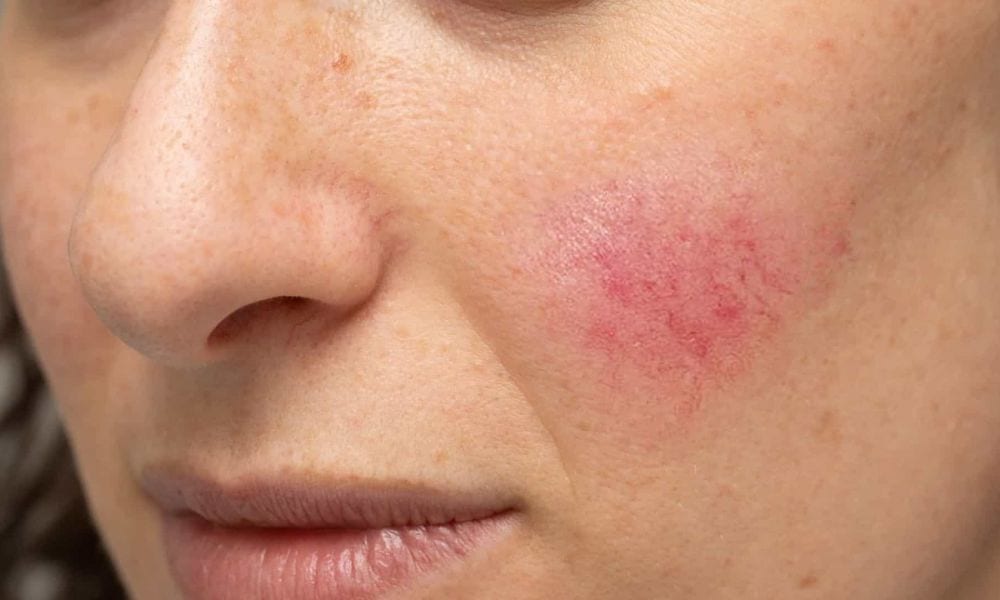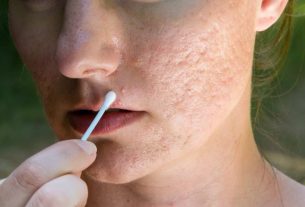Those who have sensitive skin, for whatever reason, have red skin. Find out why this happens and what care is needed.
Certainly, sensitive skin It is one of the most common problems that exist, and it can affect any skin type. Furthermore, it is complex and also has several types of variations.
Above all, sensitive skin is unpredictable. It can exhibit red spots, itching, burning, tightness and, in more serious cases, small wounds at any time of the day.
This is because this skin type has a greater tendency to sensitivity. However, this condition can happen to any skin type, from the driest to the most oily.
Cause of sensitive skin
Firstly, the skin’s physical barrier helps retain water, providing a protective barrier. When this barrier is weakened, its capacity is diminished. Consequently, it can induce or worsen skin sensitivity and discomfort.
Additionally, there is the skin’s microbiome, which also provides protection. This barrier consists of bacteria, fungi and other microorganisms that remain on the surface of the skin. Attackers are able to unbalance you in the case of skin sensitivity.
There are also other causes:
- Vascular: when the walls of blood vessels are weakened due to external factors;
- Environmental: itching or burning caused by wind, dry air, sun exposure, excessive heat or cold and pollution;
- Dermatological procedures: the skin may react to the application of poorly tolerated ingredients, in addition to very astringent soaps or acid treatments;
- Atopy: is a hereditary tendency in which the person develops allergic manifestations;
- Skin diseases: rosacea and dermatitis can cause skin sensitivity.
Above all, there are also atypical situations that lead to sensitive skin. The first of them, certainly, is the change of seasons. In winter, for example, due to the lack of humidity and reduced water consumption, the skin becomes more sensitive.
Furthermore, pregnancy can also be a kind of trigger for the problem. This is because it causes many changes in the body due to hormonal changes. And, certainly, the skin is not free from this.
Symptoms
Above all, the symptoms of sensitive skin are:
- Red spots on the skin;
- Itching in the irritated area;
- Burning;
- Repoussing;
- Irritation;
- Formation of wounds in more serious cases.
Treatment
Firstly, it is recommended to discontinue any product that causes discomfort or burning. Additionally, gently dry the affected area and avoid friction with clothing, towels, and scrubs.
It is also important to avoid hot showers and too much steam in the bathroom. Reduce your consumption of alcohol, peppers, coffee and spicy foods.
Above all, use sunscreen with at least SPF 30 and broad spectrum. Also use neutral soaps, without parabens, fragrances, alcohol or any other type of reactive substance.
Remember that moisturizers reduce irritation, in addition to restoring the skin barrier. It is important to reapply during the day, especially when exposed to very extreme weather, such as heat or cold.
Finally, to rebalance the microbiome, it is interesting that the product also provides a prebiotic action, that is, it provides food for the proliferation of beneficial bacteria on the skin, and thus strengthens the skin’s second natural protection as well.
Curiosities
Those with sensitive skin can also have rosacea. It is a chronic skin disease of unknown origin. It leaves the face more sensitive, with red spots and other more aggravating symptoms, depending on the condition, such as the formation of nodules and irritation in the eyes.
Furthermore, those with sensitive skin can shave with some care. Care such as cleaning the area to be manipulated, choosing the best hair removal method and finishing with a soothing product, such as thermal water.
Finally, it is recommended to avoid hot baths. Always prefer warm or cold water without taking too long in the shower. This way, it is possible to prevent the formation of red spots and dry skin.
Myths and truths
Firstly, they say that those with sensitive skin cannot sunbathe. This is certainly a myth. Everyone can expose themselves to the sun, in moderation and using sunscreen.
They also state that those with sensitive skin need to constantly hydrate their skin. This statement is already true. Hydration is the keyword to keep sensitive skin soft, smooth, free from red spots, allergies and flaking.
Finally, they say that sensitive skin cannot do deep cleansing. This is a myth. Those with sensitive skin can do deep cleansing, but with some care.
Did you like this article? Then you will also like this: Skin problems – 7 diseases that cause spots on the skin
Source: Derma Club ADCOS
Featured image: MS

Sign up for our newsletter and stay up to date with exclusive news
that can transform your routine!
Warning: Undefined array key "title" in /home/storelat/public_html/wp-content/plugins/link-whisper-premium/templates/frontend/related-posts.php on line 12
Warning: Undefined array key "title_tag" in /home/storelat/public_html/wp-content/plugins/link-whisper-premium/templates/frontend/related-posts.php on line 13




